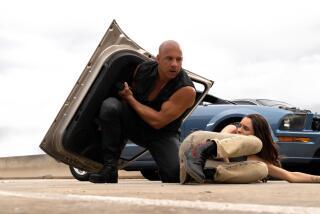Review: ‘The X-Files’ is back, less as a revival and more on its own feet
Two years ago, “The X-Files,” which ran on television from 1993 to 2002 and jumped to the big screen in 1998 and 2008, returned from narrative limbo for a six-episode “special event” season.
It left behind some memorable moments and the impression that of all the people who should be writing and directing the series now, creator Chris Carter, responsible for the season opener and closer, was possibly not among them.
Still, a good enough time was had by the people who needed to have one, and enough money made by the bodies that needed to make it, that the principal partners have reconvened for a 10-episode 11th season. It premieres Wednesday, as ever on Fox.
The good news is that a longer season gives other writers more time, and that if anything, leads Gillian Anderson and David Duchovny seem more comfortable this time out as partners in spooky crime fighting and something more than pals. It comes off less as an exercise in brand revival and more a genuine new season of “The X-Files.”
The previous season ended with a cliffhanger, with the arrival of a giant spacecraft over Washington, D.C.’s 14th Street Bridges, where Fox Mulder (Duchovny) was dying from the Spartan virus — the work of William B. Davis’ Cigarette Smoking Man — and Dana Scully (Anderson) was without any handy options to save him.
Reviewers have been asked to refrain from revealing how this resolves, but suffice it to say, as with “Flash Gordon” or Gene Autry serials of yore, there is a certain amount of rewinding involved. (It also smacks of a rethink; it has been two years, after all.) And suffice it also to say that Mulder survives into the new season. He would have to, of course, although I for one would watch a series called “Scully.”
Carter has once again written and directed the season opener, “My Struggle III” (numerically following Season 10’s opening and closing episodes), and as before it is surprisingly awkward. His dialogue is prosaic and ponderous by turns, expository and speechifying rather than conversational, and there are times I laughed out loud at an exchange clearly in no way meant to be funny. Nearly without humor, the episode seems composed with the urgency of Jean-Paul Marat writing his 14th of July call to the people of France.
Indeed, a memo appears to have gone out from Carter to his writers (again including Glen Morgan, James Wong and Darin Morgan, all of whom also direct their writing) to make sure to address the year of Trump, if scrupulously avoiding any mention of his name. (He is seen, a little, in the montage that opens “My Struggle III.”) The fact that a conspiracy theorist is occupying the Oval Office would naturally tend to take some fun out of a show that brings pseudoscience to life.
“The world has become too crazy even for my conspiratorial powers,” Mulder says at one point, but now even the villains know what’s what: “Every day a new disaster,” Carter has the Cigarette Smoking Man say. “We refuse to imagine our impending extinction, the acceleration of the cataclysms. We’ve thrown science out the window in favor of scandal and opinion, cant and all manner of ridiculous untruths.”
After the mythology-encumbered “My Struggle III,” things quickly improve with the opening of Episode 2, from Glen Morgan. Mulder and Scully are hanging out, feet up, watching old footage of the Ramones on television, as an old friend calls from out of the ether and a station wagon full of goofball assassins barrels their way.
Punk rock also opens the following episode, written by Carter — better here — in which Mulder suggests to Scully that they “jump onto I-95 and get back to our bread and butter,” which is to say, hunting monsters. (The episode features Karin Konoval, the mother in the Season 4 episode “Home,” in a sort of quadruple role.)
I am sure there are viewers for whom the mythology is the thing — from Mulder’s search for his sister, whom he believed abducted by aliens, to the “black cancer,” to Mulder and Scully’s long-lost son, William, given up for adoption to protect his life. The big themes have made “The X-Files” feel grand at times, but they can also grow tiresome — not you again, Smoking Man. Go on, end the world already!
At this point, the show works best as a kind of ritual, a collection of moments from which you can pick the ones that make you happy without worrying too much about consistency or canon — as a celebration of itself. That’s why Darin Morgan’s “The Lost Art of Forehead Sweat,” an unreliable comic turn through an alternate history of the series, is the most effective of the five episodes available for review.
It is not the only time the series looks backward. Throughout the episodes, there is not a little talk of simpler, smarter days; even the monsters have lost their mojo.
“This is my problem with modern-day monsters, Scully,” Mulder says of an illustrated beast, all teeth and mucus. “There’s no chance for emotional investment, like Frankenstein, Wolfman... There was pathos.”
“There’s a lot of money to be made in scaring people,” says Scully, who has been paying attention.
‘The X-Files’
Where: Fox
When: 8 p.m. Wednesday
Rating: TV-14-DLV (may be unsuitable for children under the age of 14 with advisories for suggestive dialogue, coarse language and violence)
Follow Robert Lloyd on Twitter @LATimesTVLloyd
ALSO
‘The X-Files’ returns with that Mulder and Scully magic (mostly)
‘The X-Files’: Remembering mood and mystery of a sci-fi landmark
More to Read
The complete guide to home viewing
Get Screen Gab for everything about the TV shows and streaming movies everyone’s talking about.
You may occasionally receive promotional content from the Los Angeles Times.







